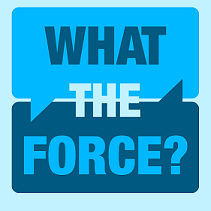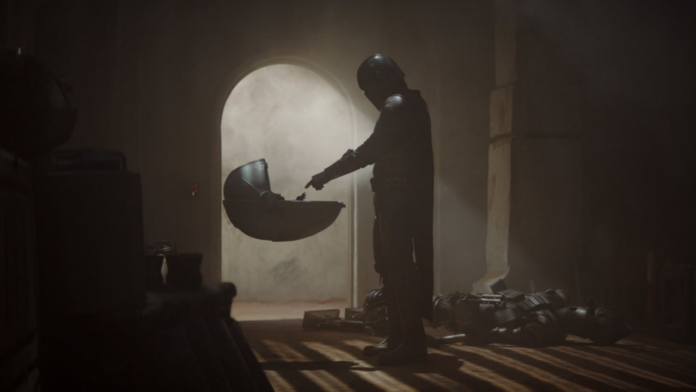As the first episode of The Mandalorian ends, the Mandalorian reaches a single finger towards the floating perambulator cradling the Child – and his life is forever changed. The center of gravity shifts towards the little figure in the floating egg.
Mando’s journey over the course of Season 1 consists of him struggling and eventually embracing the role of Dad to the Child. He overcomes reluctance and awkward growth, accepting and desirous to protect the child and exploring his new role in the child’s life. The Mandalorian does an amazing job of exploring the feelings and experiences of being a new parent and incorporating these as an important symbolic part of his Hero’s journey.
Din Djarin embarked on this Journey not only to become a hero, but also to transform into a fully realized person. To achieve that he must embrace all aspects of himself, including his nurturing self, which has been denied to him from an early age. This story is not only an important aspect of the Star Wars universe but essential for the men and boys watching the show.
I covered how The Mandalorian’s journey follows on the tracks of the Campbellian Hero’s Journey. This was confirmed by Jon Favreau, the creator of the show, in the Gallery Episodes on The Mandalorian. Typically, stories that closely map Campbell’s Hero’s Journey are about the transformation from adolescence into adulthood and one of the most transformational things that an adult can do is to become a parent, preparing the next generation of children who will become the future. Just like the mantra of the Mandalorian tribe of the show is “The Children are the Future,” Mando’s fate becomes intertwined with Baby Yoda’s as he searches for a purpose beyond his next bounty.
This story is very valuable from a cultural perspective. Being an active parent, a dad, has been long denied to men in our society. Even in recent decades, active fatherhood — beyond teaching a child how to throw a ball or change a tire — was not considered the realm of manly men.
There’s a well-documented gap in male-lead nurturing, men are socially penalized for straying from masculine norms and until recent years it was socially unacceptable that men would express emotions, especially in front of their sons, nor that they could voluntarily become the primary caregiver to their children without being perceived as emasculated (ie.stay at home dad.) This denial of affection has affected countless generations of fathers and sons. It effectively became a rejection of whole personhood.
Men need to be able to be affectionate, caring, compassionate and also be able to receive affection, care and compassion from other men to be complete. Nurturing is fundamental to building stronger societies and having, expressing and acting on empathetic feelings for those that have less power is key for progress.
Characters who traverse the threshold to start the Hero’s Journey begin their transformation. Heroes became more complete and complex people through the trials, failures and experiences that they face along the way. Din Djarin was an adult man at the beginning of the show, but adulthood doesn’t mean completeness.
Din was long denied the affection of others, through the loss of his parents and adoption into a culture and Creed which restricted emotional sharing and connection; the Mandalorians were already a pretty regimented and severe people, but by 9 ABY they’ve been Imperially traumatized into a stoic survivalist strategy. Mando never takes off his helmet, which means that he can’t share his emotions –or even physical signs of basic needs, like hunger or pain– with anyone.
Men have also been closed off from being able to express emotions and affection. One recent example was the public reaction to a picture of Joe Biden kissing his own son, Hunter, in the cheek. It was striking to see men realizing that they had missed out on displays of affection from their own fathers, who were absent, or never able to express affection to their sons. Nurturing is fundamental to growing and to build a better future. We need nurturing men.
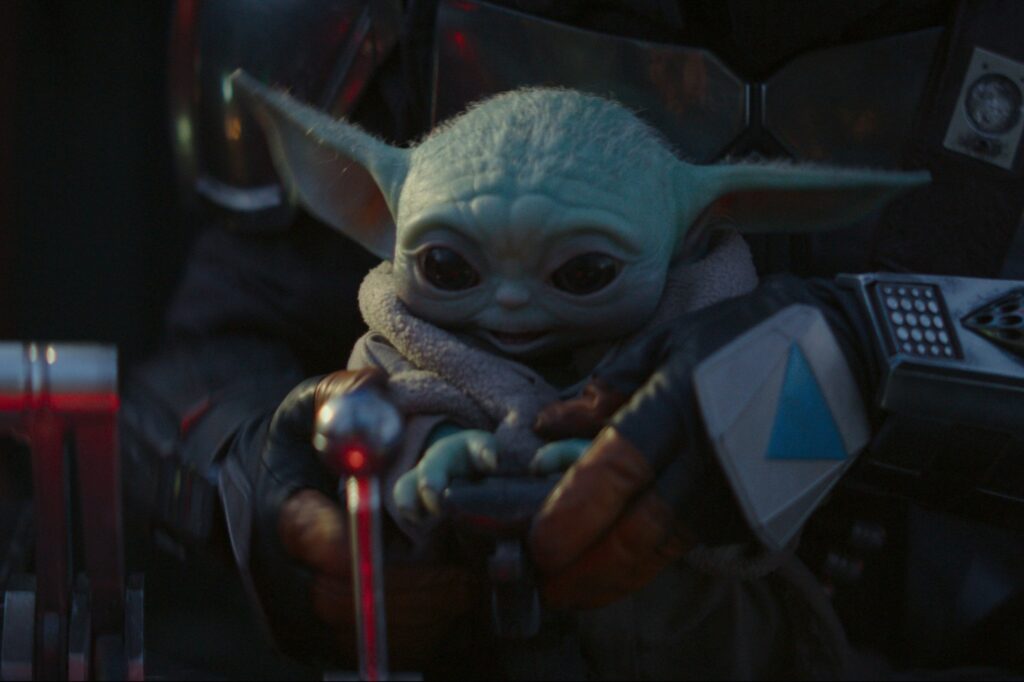
Story
Stories give us a chance to explore things long denied to us. Hero-dads are male protagonists who become fathers and which allows to frame men within a male-centric nurturing narrative that is culturally acceptable and which allows them to express traits typically perceived as masculine.
This is a male nurturing fantasy coming through in our fiction, in shows, books, movies and video games, and it is deeply appealing because of how rare it has been for generations of men to experience positive nurturing experiences from their own fathers, who were culturally praised for being emotionally or physically unavailable.
The counterpart of the male nurturing fantasy is the female power fantasy, or the desire of women characters to be powerful and find fulfilling romance.
Both of these fantasies emerge from ¡widespread, natural and unfulfilled cultural desires. In the case of the male nurturing fantasy, this fantasy is establishing a wholesome, constructive relationship with the younglings, something that has been rare in the real world. It manifests through fiction that presents “mucho macho” characters succeeding in this nurturing role without losing any clout or masculine power.
These Hero-dads have (or aim to have) internal balance, recognizing that in order to become the best fathers they have to succeed in developing traits traditionally perceived as feminine as well as the masculine ones that their environment demands. That’s the reason why more often than not these Hero-dads are single fathers doing things their own way; if a feminine caregiver were present, the nurturing role would fall on her shoulders.
These assumptions are lampshaded in Season 1, Chapter 4, when Mando thinks that he would be doing the Child a favor if he left him with Omera, although a few characters call him out on that. Not that it was ever going to happen; the show is about Mando becoming a whole person and having the opportunity to embrace all aspects of his psyche.
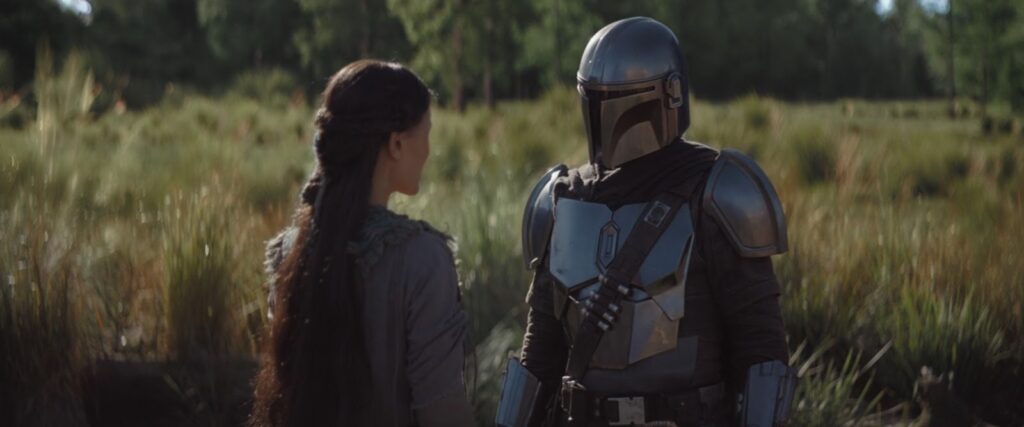
The Elixir for Din Djarin
What would be a good endgame for Din Djarin, since he took on the responsibility of carrying a Child? To become whole, Mando has to heal himself and grow as a person and as the hero of the show, he also needs to restore the community torn asunder in the start of the journey. This means restoring home and self to our Mandalorians.
At the beginning of the show, all of their artistic skills, which were showcased to great effect in The Clone Wars and Rebels, are laser-focused on forging armor and weapons as they arming their foundlings to their teeth for their own protection. Not an unreasonable position, given the state of the galaxy, but not a very family-friendly one either.
From the Hero-dad’s perspective, the ideal endpoint of a masculine nurturing fantasy is not to just to allow the Child to live happy and healthy, but to also reward the father by allowing him to continue to be a dad. That means no more battles left to fight, and a supporting community that he has renewed and restored.
Happily ever after means getting to be a father, a caring and compassionate man whose nurturing characteristics enhance his other aspects as a warrior and a hero, and to have this transformation ripple through the community — the macro-family unit. This return to a wholesome society could be reflected in the Mandalorians being able to be warriors and artists again, which are both fundamental parts of their culture, instead of being constricted to pure survival mode.
The Biggest (and Littlest) Challenge:
Din Djarin will face many battles and foes before changing the galaxy for the better — including Moff Gideon, a dark and extremely competent father to his men who paternalistically scolds the heroes… but who also has no qualms about killing The Child; a good reason for Mando to protect Baby Yoda at all costs.
On the opposite end of the spectrum, there will be the challenge of parental separation. The Child has already shown that he is his own person with his own mind, and not a mere extension of Mando — a pitfall for many parents. Realizing their individuality and letting them fly (maybe with his own tiny jetpack?) is an important milestone in the development of parent/child relationships, which will only turn them into more capable and flexible adults.
In the show, Mando is forced to separate from Baby Yoda. The Child comes back and is able to use the Force to save Din, Griff, Cara and IG-11 from an explosion. This was not an ability that Mando could have taught the Child, but a learned behaviour that reflected of the constant protection that he had offered his tiny charge.
Children will become capable and able to defend themselves and their parents, but only if parents can help them to separate successfully.
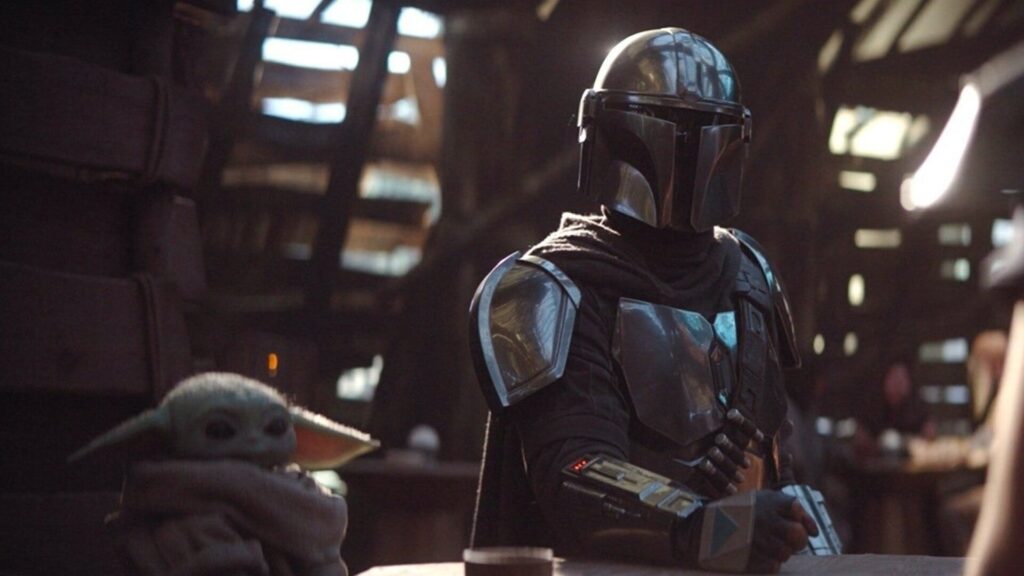
So… why does this matter?
Giving young children more opportunities to practice nurturing behaviour helps to reinforce that behavior. The Mandalorian knows that at a visceral level, and it shows even in its merch. The first official large toy was a doll of the Child, which with a cup, to feed him bone broth, and with a button that can be pressed to hear him coo and cry.
The only difference between Baby Yoda’s doll and a regular baby doll marketed to young girls is the shape. The Child doll offers young boys an opportunity to play pretend and nurture, and also to protect.
It is significant that Star Wars has embraced this, because media impact is incredibly influential from a cultural perspective. The Mandalorian (and its merch) normalizes playing with baby dolls for boys, and points towards a healthier future. And this phenomenon does not only affect young boys, but most if not all of the fans of the show; kids and adults alike are treating Baby Yoda as their collective adopted Child. After all, “The Foundlings are the future.”

